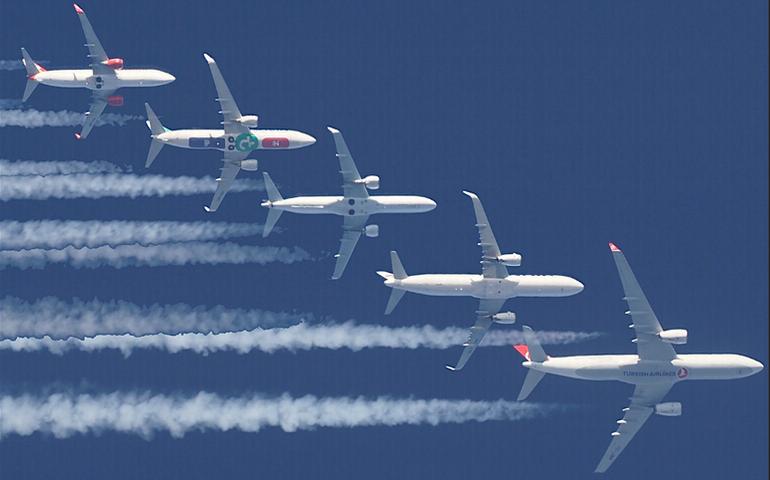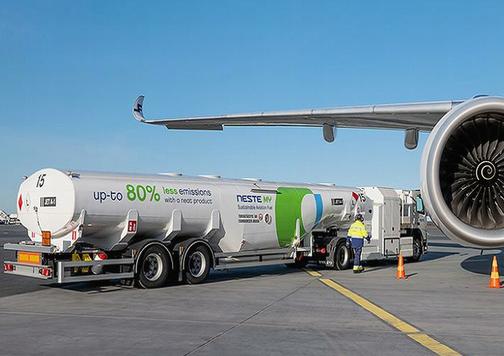EU Pilots Green New Deal With Clean Aviation Fuel Law

From top: Boeing 737-804 PH-CDF Corendon Airlines – Amsterdam to Zakynthos (40,400 ft.); Boeing 737-8K2 PH-HZL Transavia – Eindhoven to Athens (38,300 ft.); Embraer E190LR D-AECH Lufthansa – Frankfurt to Pula (37,400 ft.); Airbus A321-231 OH-LZH Finnair – Frankfurt to Heraklion (35,200 ft.); Airbus A330-343 TC-JNR Turkish Airlines – Frankfurt to Istanbul (41,300 ft.) October 18, 2022 (Photo courtesy u278) Public domain
By Sunny Lewis for MaxImpact
BRUSSELS, Belgium, April 26, 2023 (Maximpact.com Sustainability News) – The European Commission today is welcoming a provisional political agreement on the ReFuelEU Aviation proposal, reached Tuesday between the European Parliament and the Council. Once in place, the new rules will help decarbonize the aviation sector by requiring fuel suppliers to blend sustainable aviation fuels (SAF) with kerosene in increasing amounts from 2025.
Sustainable aviation fuel is produced from agricultural waste, forest waste, solid waste, food waste, wastewater sludge, used cooking oils, animal manure and algae. One gallon of SAF generates up to 80 percent less of the greenhouse gas carbon dioxide (CO2) from production to use than fuels refined from petroleum. SAFs can be blended with conventional jet fuels to power planes.
This measure on its own is projected to reduce aircraft emissions of CO2 by around two-thirds by 2050 compared to a business as usual scenario. It is also expected to provide climate and air quality benefits by reducing non-CO2 emissions.
European Commissioner for Transport Adina Valean of Romania said, “This political agreement is a turning point for European aviation, putting it on a solid pathway towards decarbonisation. Shifting to sustainable aviation fuels will improve our energy security, while reducing reliance on fossil fuel imports.”
The blending mandate is expected to increase the EU’s energy security by reducing dependency on energy products sourced in third countries.
“These kinds of measures help make Europe a front-runner in the production of innovative clean fuels, globally. We estimate that the SAF market will create more than 200,000 additional jobs in the EU, mainly in the renewables sector,” Commissioner Valean said Tuesday.
The ReFuelEU Aviation deal marks the last agreement on the transport proposals within the Commission‘s Fit for 55 legislative package. Presented by the European Commission on July 14, 2021, the package aims to enable the EU to reduce its net greenhouse gas emissions by at least 55 percent by 2030 compared to 1990 levels and to achieve climate neutrality in 2050.
Agreements have already been reached on updated rules covering emissions trading in the aviation sector and in the maritime sector, on promoting sustainable fuels for shipping, and on the accelerated deployment of alternative fuels infrastructure.
The Commission’s Executive Vice-President for the European Green Deal Frans Timmermans said Tuesday, “The EU is setting all sectors on a pathway to climate neutrality, with the measures necessary to meet our 2030 and 2050 climate targets. We have now taken another important step towards reducing emissions in the aviation sector. Fuel suppliers at EU airports must provide an increasing share of sustainable aviation fuels and aircraft operators increase their use. The EU is ready for take-off towards a more sustainable future for aviation.”
Aviation Fuel Suppliers Will Have New Responsibilities
As of February 2023, only two companies make Sustainable Aviation Fuel that is used by the major airlines at scale. World Energy, a U.S. company, has a plant in Los Angeles and is building a new factory in Houston. Neste, a Finnish oil company, produces sustainable jet fuel in Finland, the Netherlands and Singapore. Neste says its SAF is made from “sustainably sourced, 100 percent renewable waste and residue raw materials, such as used cooking oil and animal fat waste.”

These SAFs are already fueling European flights on Finnair, which partnered with Neste in April 2021. “Sustainable aviation fuels are a key element in our ambitious CO2 emissions reduction targets,” says Anne Larilahti, vice president, sustainability at Finnair. “Solving the climate challenge of aviation requires contribution from all stakeholders. Companies can reduce the environmental footprint of their business travel by choosing direct routes, flying with airlines that have a fuel-efficient fleet, and by choosing to fly with SAF. We are excited to partner with Neste in this.”
In November 2022, Neste and Airbus signed an agreement to advance the use of sustainable aviation fuel.
“At Airbus, we believe SAF is one of aerospace’s most promising decarbonisation solutions that can be used in both in-service aircraft fleets and those of tomorrow. We are proud to partner with Neste and drive forward the development and uptake of SAF, stimulating the creation of a commercially viable market for renewable aviation fuels,” said Julie Kitcher, EVP Communications, Sustainability and Corporate Affairs, Airbus. “All Airbus aircraft are already certified for flying with up to 50 percent SAF, and this partnership will be instrumental to reaching certification for 100 percent SAF by the end of the decade.”
There are drawbacks to SAFs, environmental advocates point out. The climate impact is still there as SAFs also release CO2 into the atmosphere, and SAFs are more costly than aviation fossil fuels.
Although SAFs have benefits, currently they make up a small portion of the aviation fuel market.
The new rules will require aviation fuel suppliers to supply a minimum share of SAF at EU airports, starting at two percent of overall fuel supplied by 2025 and reaching 70 percent by 2050.
The new EU jet fuel blend must contain a minimum share of the most modern and environmentally-friendly synthetic fuels. The minimum share increases over time.
Aircraft operators departing from EU airports must refuel only with the fuel necessary for the flight. This rule is aimed at avoiding emissions related to extra weight or carbon leakage caused by what in the industry are called “tankering practices.” That’s when aircraft deliberately carry excess fuel to avoid refueling with sustainable aviation fuels.
Finally, EU airports will have to ensure that their fueling infrastructure is available and fit for SAF distribution.
The blending mandate covers biofuels, recycled carbon fuels and synthetic aviation fuels, called e-fuels, in line with the Renewable Energy Directive, but it excludes food and animal feed crops, supporting sustainability objectives.
Since it will apply throughout the European Union, the new mandate will ensure a level playing field within the EU internal market, provide legal certainty to fuel producers and help kickstart large-scale production across the continent.
EU airlines will have access to increasing amounts of sustainable aviation fuel throughout the bloc.
Tuesday’s political agreement now requires formal adoption by the European Parliament and the Council. Once this process is completed, the new legislation will be published in the “Official Journal of the European Union” and enter into force with immediate effect.
This agreement is a step towards the European Green Deal and also a step towards implementation of the Commission’s ‘Fit for 55′ legislative package.
Aviation emissions in Europe increased an average of five percent year-on-year between 2013 and 2019. While dropping during the pandemic, aviation emissions are still projected to grow. The increased climate ambition of the aviation sector will be crucial for the EU to reach its climate objectives under the Paris Agreement and make the European Green Deal a reality.
To achieve climate neutrality, the EU needs to reduce transport emissions by 90 percent by 2050, compared to 1990 levels. RefuelEU Aviation will help the aviation sector contribute to achieving that target, together with the revised rules on the EU Emissions Trading System in the aviation sector.
Ralf Diemer, managing director of the eFuel Alliance, a Berlin-based interest group of more than 170 companies, associations and consumer organizations along the eFuel production value chain, said, “There is no alternative to liquid fuels in aviation. In order to pave the way to climate neutrality in this sector, it is fundamental to boost the production of climate-neutral liquid eFuels at an early stage. Ambitious quotas are crucial for this. The ReFuelEU Aviation is the only legislation that provides binding quotas for eFuels beyond 2030.”
“This long planning horizon is crucial, especially for scaling eFuels production,” Diemer explained. “The quotas now set give the industry a concrete roadmap. Nevertheless, the agreed quantities fall short of what would be technically possible and necessary from a climate policy perspective.”
The eFuel Alliance is committed to promoting political and social acceptance of eFuels and to securing their regulatory approval.

New EU Law in Line with International Aviation Ambitions
Aviation accounts for two to three percent of global CO2 emissions. As air travel is expected to double in the next 15 years, these numbers will rise. The International Air Transport Association (IATA) has already committed to achieving carbon neutral growth from 2020 onwards and net-zero carbon emissions from the global air transport industry operations by 2050.
The 41st Assembly of the International Civil Aviation Organization (ICAO), held in Montreal, Canada during September and October 2022, adopted a long-term global aspirational goal for international aviation of net-zero carbon emissions by 2050.
The aspirational goal was approved in support of the UNFCCC Paris Agreement’s temperature goals of 1.5°Celsius above pre-industrial levels, and, failing that, a rise of no more than 2°Celsius above those levels.
The LTAG report is now available to the public on the ICAO website and forms the basis for any further ICAO discussion on LTAG.
The report foresees the largest CO2 reductions by 2050 coming from fuels and cleaner energy sources, of up to 55 per cent, while new aircraft technologies are also expected to contribute to another CO2 reduction of up to 21 per cent, as well as operational improvements of up to 11 per cent.
The long-term global aspirational goal (LTAG) is a historic agreement that is intended to reinforce the leadership of ICAO on issues relating to international aviation and climate change. The adopted Resolution A41-21 is online here.
LTAG does not attribute specific obligations or commitments in the form of emissions reduction goals to individual countries. Instead, it recognizes that each nation’s special circumstances and respective capabilities will inform the ability of each country to contribute to the LTAG within its own national timeframe.
Each country’s capabilities include: the level of development, maturity of aviation markets, sustainable growth of its international aviation, just transition, and national priorities of air transport development.
Resolution A41-21 requests that the ICAO Council, among other tasks, achieve these performance levels:
- Maintain and update guidance on operational measures to reduce international aviation emissions, and place emphasis on increasing fuel efficiency in all aspects of the ICAO’s Global Air Navigation Plan; and encourage States and stakeholders to develop air traffic management that optimizes environmental benefits.
- Continue to provide the forum to exchange information on best practices for Green Airports, covering such subjects as smart buildings, renewable energy, green mobility, climate change adaptation and resilient development, community engagement and sustainability reporting, aiming at sharing lessons learned and best practices among airports;
- Publish and maintain guidance material on the implementation of environmentally sustainable practices at airports, including the Eco-Airport Toolkit e-collection; and
- Encourage States to pursue a climate-resilient development of their aviation systems and infrastructures, with a focus on the development of policies that integrate climate mitigation and adaptation actions to advance the sustainable aviation development.